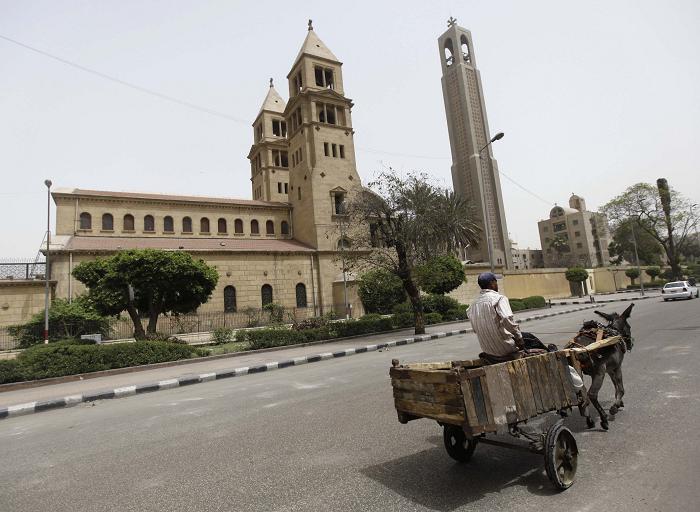Latest NEWS
- Aswat Masriya, the last word
- Roundup of Egypt's press headlines on March 15, 2017
- Roundup of Egypt's press headlines on March 14, 2017
- Former Egyptian President Hosni Mubarak to be released: lawyer
- Roundup of Egypt's press headlines on March 13, 2017
- Egypt's capital set to grow by half a million in 2017
- Egypt's wheat reserves to double with start of harvest -supply min
- Roundup of Egypt's press headlines on March 12, 2017
Egypt inflation dip unlikely to continue - analysts

A man rides a donkey cart in front of the main Coptic cathedral in Cairo on April 8, 2013. REUTERS/Amr Abdallah Dalsh
CAIRO, April 10 (Reuters) - Egyptian inflation eased in March against most expectations, but analysts said a depreciating currency and planned subsidy cuts mean the fall in the inflation rate is unlikely to continue.
Data released on Wednesday showed price inflation in towns and cities fell to 7.6 percent in the year to March after a sharp rise to 8.2 percent the previous month.
Economists called the dip surprising and ascribed it to a lower than anticipated rise in food prices.
"The surprise was mainly driven by lower-than expected increases in food and non-food inflation," said Mohamed Abu Basha of investment bank EFG Hermes. "Food prices rose 1.4 percent month-on-month against our expectation of 3.2 percent month-on-month."
The March figure was well below the bank's expectation of 9 percent, but Abu Basha said EFG maintained its 2013 average inflation forecast of 12.1 percent year-on-year.
"The decelerating inflation level might postpone further policy rates hikes by the Central Bank of Egypt until after the next meeting (on May 9)," he added.
The central bank raised interest rates last month in an effort to curb inflation and slow the Egyptian pound's slide.
Annual core inflation slowed to 7.03 percent in March from 7.68 percent in February, the central bank said.
Oliver Coleman, an analyst at risk consultancy Maplecroft, said he saw no sign of an end to Egypt's inflationary pressures.
"There are still some serious economic hurdles to overcome before we see stabilisation," he said.
An IMF delegation has been in Cairo since last week for talks on a $4.8 billon loan, which would be conditional on reforms of costly fuel and food subsidies and tax increases.
Such measures are unlikely to play well with a population heavily reliant on subsidised goods. More than 40 percent of Egyptians live on less than $2 a day.
The Islamist-led government is seeking to avert social unrest over fuel shortages and food prices during a long, hot summer before parliamentary elections expected in October.
"These figures are unlikely to ease the considerable economic hardships faced by the average Egyptian," Coleman said.










